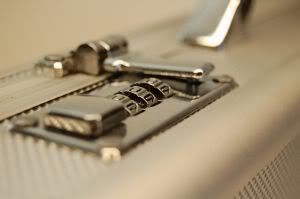Deal or No Deal
 When the game show “Deal or No Deal” became popular, I read a few comments about the show saying that it was teaching the American public basic statistics. I chuckled at that since it was quite true. For those of you who haven’t seen the show, the basic premise is that the contestant chooses a briefcase that holds a hidden amount of money. As the show progresses, the contestant eliminates other cases and those cases reveal the amount of money in them. After each batch of elimination, the contestant is offered a sum of money based on the amounts that have not been revealed. The contestant then decides if they’ll take the money and run or keep playing. So at different junctures in the show, typically during a commercial break, the contestant must make a decision.
When the game show “Deal or No Deal” became popular, I read a few comments about the show saying that it was teaching the American public basic statistics. I chuckled at that since it was quite true. For those of you who haven’t seen the show, the basic premise is that the contestant chooses a briefcase that holds a hidden amount of money. As the show progresses, the contestant eliminates other cases and those cases reveal the amount of money in them. After each batch of elimination, the contestant is offered a sum of money based on the amounts that have not been revealed. The contestant then decides if they’ll take the money and run or keep playing. So at different junctures in the show, typically during a commercial break, the contestant must make a decision.
Now it would be easy to take the contestants to task for often making poor decisions, but I would not discount the impact of being on television and the pressure the show puts on you to hamper their decision-making ability. It is easy to be sitting at home with nothing at risk and make a decision; it is much more difficult to be in a strange environment with strangers yelling instructions at you, loud music, bright lights, and someone staring at you waiting to make a decision. So often people don’t make the best decision. Sometimes it works out for them and sometimes it doesn’t. Ultimately it makes compelling television to millions of viewers and that is what the TV studio is concerned about.
But taking the emotion out it, the decisions made in the show are fascinating. You know that the one million dollar briefcase is still out there somewhere, do you settle for a measly one hundred thousand? What if over half of the cases were under one hundred dollars? I watched an episode where the contestant had a similar set up. There was an over 50% chance that the suitcase he chose was going to be under $100, although the million dollar case was still out there as well as one over $100,000. He was offered around $75,000 to walk away. He thought about it and after the commercial break decided to take the deal. So he got $75,000. When they revealed the case he had chosen, it held the million dollars. Did he make a bad decision?
He made the best decision he could based on the information he had available at the time. There was a much greater chance that his case held less than $75,000 so he did the right thing. It turns out he could have made a better decision, but that was only known after the fact when perfect information was available.
I bring up all of this because in our lives, there is this need to gather all of the information possible before you make a decision. Unfortunately, rarely will all of the information be made available, so you can either wait until you gather all the information or you do what is best based on what you know. Of course if you wait, you can ultimately not make any decision, in effect making the worst choice. Truly the best option is to make your best decision even with imperfect information.
There is nothing wrong with making the correct decision that turns out to be the wrong one. The contestant up above walked out of there $75,000 richer than he had walked in, he is definitely a winner. Sure his victory is soured by the fact he could have walked out with a million dollars but it was more likely he would have none. He made the correct decision.
So the next time you are facing an important decision, gather all the data you can and make it based on what you know. If it turns out badly, or not as good as it could have, realize that short of inventing a time machine, you could not have made a better decision.
Posted: July 23rd, 2008 under Decisions.
Comments: none